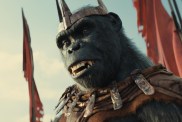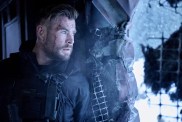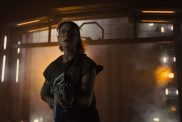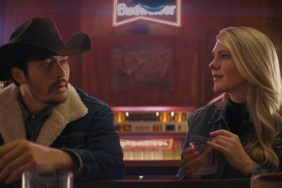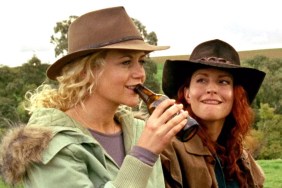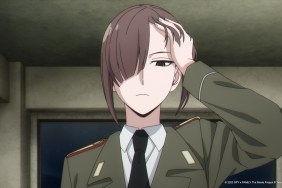Wolf Creek director talks about his giant croc film

Since Steven Spielberg’s great white shark reared its nightmarish set of chompers and tried to take a bite out of Roy Scheider’s ass in “Jaws,” the nature-run-amok genre has arguably not so much evolved over the last thirty-two years as it has devolved. A tip ‘o the hat and a big thanks to the Sci-Fi Channel, purveyors of fetid small screen CGI-dependent Mother Nature mash-ups that don’t ask you to check your brain at the door but request you to blow it through the back of your skull with a 12-gauge. Hollywood, however, has flirted with plenty of freaks of nature, particularly killer crocodiles – Tobe Hooper’s Crocodile, Steve Miner’s Lake Placid, it’s direct-to-TV follow-up, Lake Placid 2 (thank youuuu Sci-Fi!) and the ill-advertised Primeval being four recent examples.
It’s time to make some room for Rogue from writer-director Greg McLean. This Australian celluloid renegade wielded an edge as sharp as his North American counterparts in 2005 with the Outback thriller Wolf Creek. Given a bigger budget ($25 million versus Wolf Creek‘s $1.38 million), McLean’s threat has exponentially grown, too, as Rogue‘s focus falls on a giant saltwater crocodile that has taken a liking to a tourist boat operated by the lovely Kate (Radha Mitchell) and carrying an American journalist (Michael Vartan). McLean shot much of the film in Australia’s Northern Territory, relishing its “epic, ancient landscape,” for fifteen weeks.
Harvey and Bob Weinstein of Dimension Films greenlit the project based on their satisfaction with Wolf Creek and have plans to release the film in a domestic limited release soon (it opens in Australia on November 8th). ShockTillYouDrop.com met with McLean by the poolside patio of the Standard Hotel in Hollywood at the tail-end of a Tinseltown trip to meet with a variety of development execs about a possible project.
ShockTillYouDrop.com: “Rogue” is a script you penned before “Wolf Creek,” why did you decide to the revisit the property? Obviously the success of “Wolf Creek” helped propel it into production easier, no?
Greg McLean: “Rogue” was written twelve years ago, it was one of the first scripts that I wrote and it was always designed to be a classical, old-fashioned monster movie. I really wanted to blend the really realistic FX, genuine suspense and real characters. Not popcorn, cheesy horror film characters, but something that was closer to the mold of “Alien” and “Jaws.” I tried to set it up back then, years ago, and it got set up by this company and they kicked me off the film. It was a huge disaster, but it was a rite of passage for me in getting it made. “Wolf Creek” came along and it allowed me to go back to “Rogue” and make the film I wanted to make. I changed the script a bit and got it ready to make.
Shock: How did the script evolve during that time?
McLean: A lot of the sequences and situations remained the same. The main thing was characterization and trying to keep the characters, on the one hand, kind’ve keep them movie characters in that they have to have journeys and back stories, but also keep it mundane. The thing I learned on “Wolf Creek” was the value of the “everyday” in horror movies in particular because you have to have that sense of the normalcy of the day. There’s too many clichés in movie characters and we have to learn how to avoid them, so what I learned was to not be scared to let things be simple.

Shock: You had mentioned “Alien” and “Jaws” as inspirations, but what about Lewis Teague’s “Alligator” or perhaps even your fellow countryman, Russell Mulcahy’s “Razorback”? How did you try to transcend the typical nature-run-amok genre?
McLean: Most movies end up being poor versions of “Jaws” to some degree, whether it’s stalking the creature or the animal has gone wild. “Anacondas” – I really hate that film…a lot. And when people say, Oh, “Rogue” is like “Anacondas” except with a crocodile, I want to f**kin’ kill ’em. I kinda enjoy them all, the really bad ones and the really good ones, but what you hope is that they don’t relate your film to “Anacondas.”
Shock: You’re talking about the sequel, the hunt for the blood orchid whatever…
McLean: Terrible!
Shock: Being a newcomer to the genre, what was your mindset after the release of “Wolf Creek” – were you surprised by the reaction?
McLean: I was incredibly excited that people liked it. The risky ideas that I tried, in terms of the structure of the film, and the intensity paid off. Because it could’ve gone the other way. It could’ve been rejected and people could’ve said it was a piece of shit. But it was an amazing thing. Since we got the go to make the film and we got the budget, we were just focused for two years solid making the best film we could and using the little money that we had. And really just trying to make the film work. This sounds weird, but it was such a passion project, it could have been the only chance I had to make a film and if I failed I was f**ked. So I knew it had to work and make sure every aspect of it was perfect.
Shock: I’m sure it bolstered your confidence to tackle the demands “Rogue” posed.
McLean: Even though the scale was twenty times the size. It was good to go in and do a bigger film that I knew so well because I had this film in pre-production years ago. It was literally easy to direct because I had written so many drafts of it. I walked in knowing every possible permutation of how this could turn out which is good going in.
Shock: Can you talk about some of your casting decisions?
McLean: We were getting really close to shooting and we didn’t have anyone for the role Michael Vartan is in. We had all of these lists and my agent said I should check out Michael. I hadn’t seen much of his work before. I saw “Alias,” I didn’t watch the show and I thought he was a really good actor. I was looking for someone who looked very American. Michael has that classical, American look. And he’s a really good subtle actor as well. So, they screened “Wolf Creek” for him and he was like, This is really f**ked up, I love it. He wanted to do something different and he loved the way we let the actors move around on set and while we found them with the camera. TV’s just close-up, close-up, close-up. He wanted to do something that was a bit more free. I didn’t have time to listen to anyone complain about the shoot, so I told him outright, This is gonna be f**kin’ hard work. You’re gonna be in the bush. There’s gonna be snakes and crocodiles, are you cool with that? The more I told him he shouldn’t do it because he was gonna die, the more he was open to it. People always talk shit while making movies because they’re f**kin’ assholes, but he was a real trooper and it was a really hard shoot. He couldn’t easily said, You f**ckin Aussie wankers, get me my agent?

Shock: You also reunited with John Jarratt who we lost saw as the malicious Mick Taylor in “Wolf Creek.”
McLean: I didn’t have John in mind for the role he’s in at all…and he was quite pissed off about it. It just didn’t click with me and he said, Oh, let me try it, I’ll send you something. So, he took a photograph of himself with the hat and glasses and I looked it over. I thought he looked so great. He’s so identifiable as Mick Taylor and to see him like this is great.
Shock: And who does he play?
McLean: He’s a taxi cab driver named Russell, this old guy who has died and has gone on this trip to get away from that. It’s really good. The theatrical cut of this film has very precise storytelling and a very fine narrative and for the unrated DVD we put together, there are all of these really great scenes with him that are great dramatic moments but actually slow the film down a bit, we put them all back and they’re some of John’s best scenes.
Shock: And you’ve got Radha Mitchell who’s sort of a pro at this point in the genre.
McLean: She’s just a really good actress. I think she’s smart enough to know that genre films, when done well, can be great. I think overall we’ve got a great cast ’cause we also got Sam Worthington who was just cast in James Cameron’s “Avatar.” I got my dream cast.
Shock: A bigger cast for you, too.
McLean: It was like directing theater because, at certain times, you did have to stage all of these actors.
Shock: How was it moving from one film where the scares could arise organically out of a situation on the shooting day if need be versus adhering to a plan because of the CGI crocodile and the scene preparation that comes with that? Were you able to improvise at all if the frights just weren’t working on the set or were you locked in?
McLean: It’s different, but it’s still flexible. On the stage for the big crocodile fight, we had planned for maybe four month. And then we basically had the virtual cameras placed around the space so we knew what we were gonna get, and that was fun. So we kind’ve knew what it was, but it change and evolve in the sense that over time we’d look at a part and think, That’s not working, and be able to clip and take a piece out. It is organic. But in terms of the shots you’re achieving, it is very much what’s on the board is what you have to get. It was plate gathering, like, we’d have to get 400 plates, it does tend to be pretty f**kin’ crazy. And it makes me admire people like Peter Jackson who go off and get these 5,000 FX plates.
Shock: And how many CGI FX shots do you have?
McLean: About 500 and that’s including matte paintings. We started with like 300 and I just kept adding and developing them as we went?
Shock: Were the FX the biggest challenge for you on this venture?
McLean: No, the challenge was how to make a… Well, once our characters get to this island in the film, they’re basically stuck there. When we first got to pre-production and I was storyboarding everything with the storyboard artist, I said, Holy f**k, we’ve got fifty minutes of people on this island doing f**kin’ shit. This is going to be the most boring film in history. I really had to design incredible ways to make it interesting. The challenge was to keep something very simple very cinematic and not make it look like some stupid TV show.

Shock: You had mentioned that you wanted to utilize the FX for a realistic-looking crocodile, but were you judicious in your approach or is this creature out in the open?
McLean: Less is more, of course. My approach is the creature is always worse than the one you can show, however, I do understand that if you don’t pay it off the audience will f**kin’ kill you. So, you half see it so you get a sense of what it is, then you go, Okay, let’s go balls-to-the-wall and get right in there with it. Because if you don’t blow it out. And if you blow it out, it has to be amazing. We have a ten minute sequence of Michael with the crocodile sharing the same space.
Shock: Who’s responsible for creating the croc?
McLean: The FX are incredible – Fuel, this visual FX in Sydney did all the CG and stuff. Then we had John Cox who was responsible for all of the maquettes and robotic crocodile stuff. We said to them, Past movie crocodiles are shit usually because people always try to characterize them. Try to make them look like an evil thing. Just take the f**kin’ animal and make it really big. Don’t try to make it a bad guy, it’s just an animal. So they spent months researching crocodiles and getting down the muscle movements and stuff. During a test screening we did, we actually had people put on their score cards, Gee, how did you train and get such a big crocodile. Well, shit, that’s a compliment?
Shock: And how about yourself? Been to many croc farms for research?
McLean: Oh yeah. After I wrote the script I went out camping for a week by myself and went to every crocodile farm, went on all of the cruises. The tour in the film is the same one I went on.
Shock: Did you get a chance to see “Primeval” at all?
McLean: I did! F**kin hell, man. What were they thinking? ‘Cause I knew about it, someone sent me the script last year. And it’s a good movie, it was a good read. But it was no competition ’cause it wasn’t a horror movie, it was a drama and it wasn’t about the crocodile. They must’ve freaked out, because they pushed it out. The FX didn’t even seem finished because what crocodile moves like that? It was like an insect. Small crocodiles can actually run, they can gallop and I think they said, Let’s make a nine meter croc do that. It was bizarre. It was like “Cry Freedom” meets…I dunno.
Shock: You’re approach seems to distill a lot of ideas and extracts their most primal elements. You had mentioned before, simplicity. Is this something you want to continue to do?
McLean: I do think sometimes the basics don’t change and they never will. The fundamentals of any storytelling genre are really, really basic. I’m drawn to working out what are the primary structures and what things are really about? And to do that in fresh way so that new audiences, people who are 15 today, can experience that stuff that’s really raw. Look at that simple genre stuff. There’s something that I’m working on now that’s another horror film – it’s at a mixed stage. What I did love doing was working on a film with FX and mixing up that sorta stuff. I’m curious to take that further. I should know in the next couple of months what I’m doing next.





Source: Ryan Rotten
